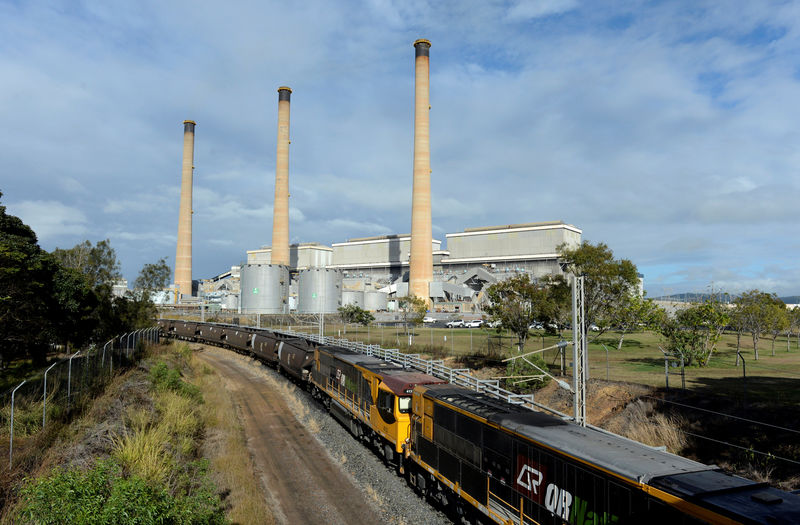By Henning Gloystein and Timothy Gardner
SINGAPORE/WASHINGTON (Reuters) - China, the world's biggest coking coal importer, is scrambling to cover Australian supply disruptions after Cyclone Debbie knocked out mines and rails by turning to an unusual source: the United States.
Debbie, which hit Australia's Queensland state last week, caused the evacuation of several mines and damaged coal trains supplying export terminals, triggering two miners - Yancoal Australia (AX:YAL) and QCoal - to declare force majeure on its deliveries. With other miners like BHP Billiton (AX:BHP) and Glencore (L:GLEN) also affected by the storm's fallout, more disruptions may follow.
Force majeure is a commercial term that means a buyer or seller cannot fulfil their obligations because of outside forces. It is typically invoked after natural disasters or accidents.
The outages caused Australian coking coal futures on the Singapore Exchange on Monday to spike by over 43 percent to a last settlement of $225 per tonne, the highest since the beginning of the year.
Australia is the world's biggest coking coal exporter and is China's largest supplier, leaving steel makers scrambling to find alternative supplies.
Spot coking coal prices on the Dalian Commodity Exchange, closed on Monday and Tuesday for a public holiday, jumped over 7 percent early on Wednesday to $197.8 per tonne, their highest level since December 2016.
"The Chinese are fixing cargoes from the United States in order to replace the shortfall from Australia," one coal trader with knowledge of the matter said, speaking on the condition of anonymity as he was not cleared to talk about commercial deals.
"More will make its way from the U.S. to China very soon," he said.
George Dethlefsen, Corsa Coal Corp 's (V:CSO) chief executive, said his company has been overwhelmed with inquiries for cargoes over the past few days from customers in Asia.
"Right now we, like everyone else, are trying to figure out what tonnes are available and what we can produce to fulfil potential new orders," he said.
Thomson Reuters Eikon data shows that China already has imported more than 500,000 tonnes of U.S. coking coal in 2017, with 427,000 tonnes shipped in just in February, ending a two-year stretch when no coking coal was shipped between the two countries.
Chuck Bradford of Bradford Research said the February coal sold for nearly $190 per tonne.
President Donald Trump has promised to revive the U.S. coal industry and issued an executive order last week to dismantle former President Barack Obama's regulations on the sector.
Luke Popovich, a spokesman for the National Mining Association trade group, said it was not clear that the demand had any link to the administration's push to axe regulations.
STILL MORE NEEDED
As China returns from its long weekend, it will require even more coal, as the Australian outages far outstrip what is immediately available from the United States.
"The minimum impact over the coming weeks we would expect would be in the region of 14 million tonnes of coal (11.5 million metallurgical, and 2.5 million tonnes thermal)," said Rodrigo Echeverri, head of energy coal analysis at commodities trading house Noble Group (SI:NOBG), adding that the current estimate was for the outages to last around five weeks.
Shipping data in Eikon shows that over 70 ships are waiting to load the marooned coal off the Queensland ports of Abbot Point, Mackay, Dalrymple Bay, and Hay Point.
China has also turned to Russia for more coking coal, with imports already rising to over 400,000 tonnes in February from 275,000 tonnes in December.
Mongolia and Indonesia are other potential sources of coking coal for China, three coal traders said. Anthracite coal shipments from North Korea to China, also used as coking coal, have dried up after Beijing ordered an import ban following missile tests of its isolated neighbour.
Overall, traders said it was unlikely that all of China's near-term demand could be met without Queensland supplies, likely requiring inventory drawdowns, which will push up prices.
The supply squeeze has also affected the market for thermal coal, used in power generation, where benchmark Australian cargo prices from its Newcatle terminal have soared over 11 percent this month to $90 a tonne, the highest since the beginning of the year.
"The Pacific basin is showing signs of sudden tightness which is very likely based on the disruptions in Queensland," said Georgi Slavov, global head of energy, iron ore and shipping research at commodities brokerage Marex Spectron.
